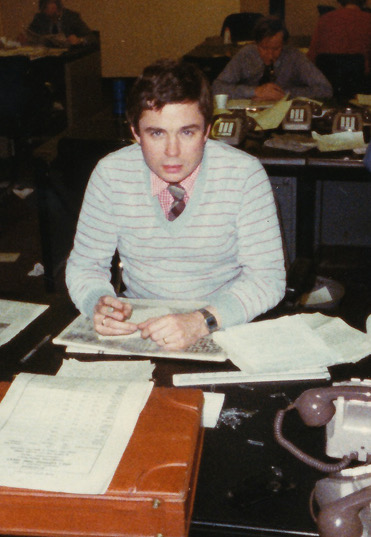By ALASTAIR McINTYRE
I never really intended to get a job on the Daily Express, in fact I had tried in a half-hearted way to avoid it. But money talks.
It was 1974 and I was a sub-editor on the day staff of the Press Association. One lunchtime, with nothing better to do, I picked up a copy of UK Press Gazette and perused the Sits Vac pages which in those days were filled with jobs. I had been on PA for just over a year so it was clearly time to move on. Have pen, will travel and all that.
My eyes alighted on the following advertisement, which read: ‘National newspaper requires a news sub-editor, apply to Box Number xxx.’
I hadn’t a clue which newspaper was advertising but the following morning I strolled up Fleet Street and delivered my letter of application to the UKPG offices in Chancery Lane. I thought very little more of it until the phone rang that afternoon. I was flabbergasted to hear the voice of Morris Benett, managing editor of the Daily Express, inviting me for an interview. ‘When can you pop over,’ asked Morris – the Express was directly opposite the PA building in Fleet Street. ‘Can you make it this afternoon?’
I popped over and so it was that I found myself in the offices of the Daily Express, the last paper in the world that I ever thought would employ me, limp-wrested Liberal that I was in those days. A brief chat with Morris followed, during which he asked daft questions like where I had been for my holiday and whether or not I was married.

McIntyre at work on the Express in 1976, cigar and crossword at the ready. Barry Hibbitt dozes off in the background
We got on quite well and after about 10 minutes he asked me: ‘So when can you start?’
Surprised at the job offer coming so swiftly, I replied with alarming honesty: ‘Well I’m not really sure I want to work for the Express.’
Morris was taken aback. ‘Well do you want the job or not?’ he asked.
A brief period of agonising indecision followed but, after reflecting on the riches it might bring, I accepted.
The Express was short of staff because, in the fine tradition of Fleet Street, Beaverbrook Newspapers had launched a cost-cutting operation and offered all their highest-paid subs generous redundancy payments. Newspapers were thriving in those days so the offers were taken with alacrity and the staff went off to high-paid jobs on other newspapers.
Thanks to Ray King, an Express sub whom I had first met when we were both working on the Slough Evening Mail, I knew how much to ask for as my starting salary. I requested £90 a week, stressing that I now had two daughters, Jane, then four, and Sarah, two. Morris looked shocked.
‘We can’t possibly pay you that much old son,’ he said, ‘how about £84?’ As I was earning only £66 a week at PA I accepted with a feigned reluctance in the best traditions of Fleet Street.
When I joined the Express a month later I discovered the staff had received a monster pay rise and my starting pay was in fact £96 a week. Not only that but there were expenses. The company paid our phone bill, gave us a newspaper allowance and even allowed us to claim for late meals twice a week – the hours for a normal subbing shift were 3.30pm to 11.30pm or 5.30pm to 1.30am. These hours included a break, or drinks interval, which was as long as you could possibly make it.
As I said, money talks, and in those days of high inflation the pay kept rising without too much effort on my part.
Reader, I stayed for more than 32 years … until the management paid me a healthy sum to go away. I went with a song in my heart and many happy memories of the last great days of Fleet Street.
